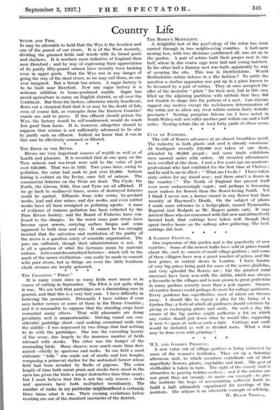THE Doom OF THE RIVER.
Rivers are very important sources of wealth as well as of health and pleasure. It is recorded that at one quay on the Tees salmon and sea-trout were sold to the value of just over £20,000. That was in 1923. Two years later, owing to pollution, the value had sunk to just over £1,000. Salmon fishing is extinct on the Irvine, once full of salmon. The commercial fisheries on the Wear are dead. The Clyde, the Forth, the Girvan, Nith, Don and Tyne are all afflicted. If we go back to mediaeval times, scores of destroyed fisheries could be quoted. Effluents from coke ovens, by-product works, lead and zinc mines, and dye works, and even rubber works have all been arraigned as polluting agents. A mass of evidence of ruinous pollution has been collected by the Pure Rivers Society, and the Board of Fisheries have con- fessed to the charges. In the worst cases pure rivers have become open sewers, carrying surface fungus and scum apparent to both nose and eye. It cannot be too strongly insisted that the salvation and restitution of the purity of the rivers is a question solely of scientific organization. The laws are sufficient, though their administration is not It is all a question of what the Germans mean by material culture. Active and decentralized factories—which will be the mark of the newer civilization—can easily be made to consort with pure rivers, but as things are even the little Southern chalk streams are locally poisoned.










































 Previous page
Previous page